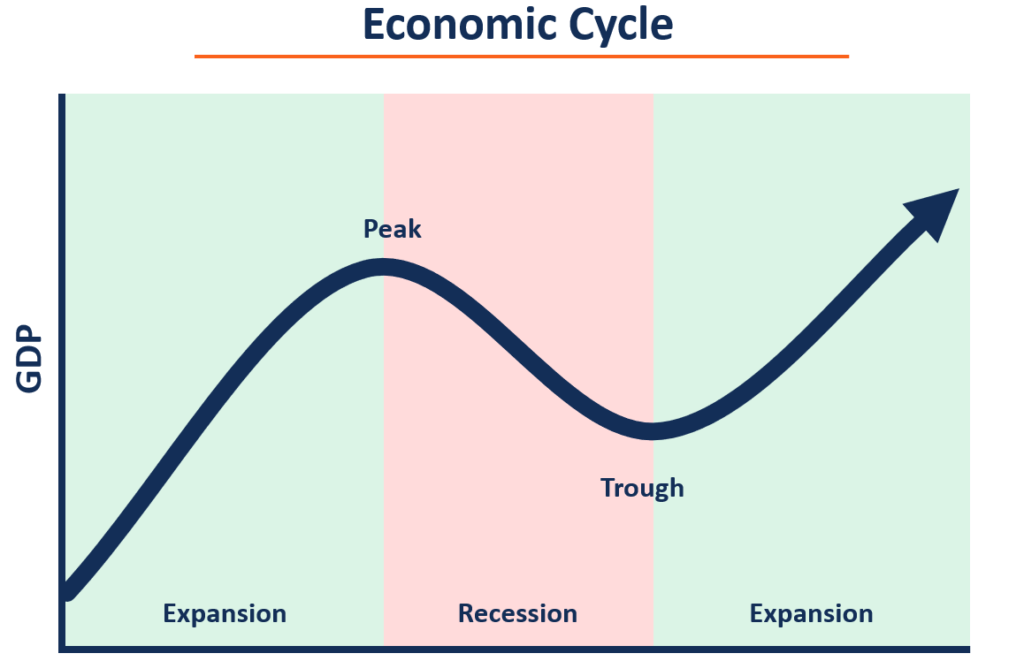Economists Refer to the Continuous Contraction and Expansion of an Economy as the
Economic Cycle
The fluctuating state of an economy from periods of economic expansion and contraction
What is the Economic Cycle?
The economic cycle is the fluctuating state of an economy from periods of economic expansion and contraction. It is usually measured with the Gross Domestic Product (GDP) of a country or region. Other economic factors, such as employment rates, consumer spending, and interest rates, can also be used to determine the stage of the economic cycle.

Understanding Economic Cycles
The economic cycle is also known as the business cycle, and it is the fluctuating state of a market-based economy. An economy is a term that describes a set of production and consumption activities that determine how resources ought to be allocated.
In today's world, virtually every economy is a market-based economy in which the laws of supply and demand determine prices.
Supply and demand pressures influence the economy through different variables, such as global economic conditions, trade balances, productivity, inflation rates, interest rates, and exchange rates. The variables, in aggregate, shape the economy and the state of the economic cycle.
The economic cycle is a trend of upward and downward movements of GDP that ultimately determines the overall long-term growth of an economy.
GDP measures the aggregate value of goods and services and is used to depict the overall wealth of an economy. Higher GDP usually correlates with more well-off citizens.
Stages of the Economic Cycle
The economic cycle goes through four stages:
- Expansion
- Peak
- Contraction
- Trough
Once the cycle is complete, it continues from the start again. No definite rule exists in determining how long each phase lasts; in fact, expansion phases can last many years before hitting a peak. However, a healthy economy will always go through a contraction phase once in a while.
During the expansion phase, an economy will experience strong growth, and interest rates will generally be lower but will begin to increase as the expansion matures. The overall production level increases, and inflation rates begin to rise as the expansion matures.
The peak is reached when the growth of an economy reaches a plateau or maximum rate. It is usually characterized by higher inflation that needs to be corrected.
The correction occurs through the contraction phase, wherein the growth of the economy slows, unemployment rates rise, and inflation tapers off. It continues until the cycle reaches a trough.
The trough is characterized as a low point in the economy from which it can re-enter an expansionary phase.
Importance of the Economic Cycle
Every person is a participant in the market-based economy. The defining factor of the success of a market-based economy is that it essentially makes everyone better off by producing and consuming more goods and services over time. The GDP of an economy captures the increased production and consumption levels, and a growing GDP is an important aspect of a successful economy.
Given that everyone is a participant in the overall economy, it makes sense that everyone is impacted by the state of the economic cycle. It is usually in everyone's best interest for the economy to be in an expansion phase to accumulate more wealth.
Impact of Economic Phases
When the economy is in expansion, businesses generate profits, which leads to hiring more employees, and more disposable income and spending. It, in turn, leads to more profits for businesses, and it continues in a virtuous cycle.
When the economy is in contraction, businesses lose profits, which leads to downsizing and laying off of employees. When employees lose their jobs, there is less disposable income and less consumer spending, which leads to even lower business profits. It continues in a vicious cycle.
An economy should be in continuous expansion; however, contractions are needed to keep inflation in check and to make sure the economy does not overheat.
An overheated economy is an economy that has experienced a long period of strong economic growth but also has begun to reach high levels of inflation. Inflation that is too high leads to inefficiency within a market-based economy.
Related Readings
CFI is the official provider of the global Commercial Banking & Credit Analyst (CBCA)™ certification program, designed to help anyone become a world-class financial analyst. To keep advancing your career, the additional resources below will be useful:
- Supply and Demand
- Economic Indicators
- Gross Domestic Product (GDP)
- Market Economy
Source: https://corporatefinanceinstitute.com/resources/knowledge/economics/economic-cycle/
0 Response to "Economists Refer to the Continuous Contraction and Expansion of an Economy as the"
Post a Comment